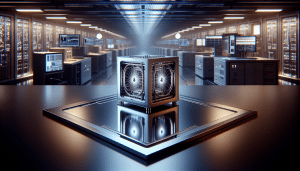Artificial Intelligence Shaping the Future You Experience
Oliver Cooper August 31, 2025
Discover how artificial intelligence is already changing the way you live, work, and connect with the world. This guide explores emerging AI trends, surprising applications, and what you might expect as technology advances rapidly in tech and science.
Understanding Artificial Intelligence in Everyday Life
Artificial intelligence (AI) is no longer a distant dream; it’s woven into the fabric of your daily experiences. Every time you ask a voice assistant for directions, get music recommendations, or receive an automated reply to an email, you’re interacting with AI. This technology uses machine learning algorithms to recognize patterns, predict outcomes, and make decisions. The convenience it brings is hard to ignore, especially as these systems adapt more smoothly to your personal preferences. Technologies behind AI are usually invisible, yet their effects are visible and growing. From online shopping suggestions to language translation, artificial intelligence is always working in the background, creating efficiencies that benefit millions.
The impact of artificial intelligence is not confined to homes; it stretches across public spaces and industries. AI-driven surveillance systems can detect anomalies, helping to improve public safety. Healthcare institutions employ artificial intelligence to assist with diagnostics, often leading to faster and more accurate treatments. Online banking applications and fraud detection are now largely dependent on smart algorithms that can spot suspicious activity faster than a human investigator. These applications are now considered essential rather than novel, gradually shifting how you interact with information and services in society.
Many people are still unaware of the full extent AI influences daily routines. Emerging trends indicate that integration will only deepen as time progresses. With growing access to intelligent devices and cloud-based systems, you can expect artificial intelligence tools to get smarter and more responsive. Keeping up with these advancements provides a practical edge, revealing potential for convenience, security, and opportunity. Learning about AI and machine learning opens up pathways for not only understanding but also participating in the unfolding technology landscape.
AI and Automation: Transforming Work and the Economy
Workplaces have seen significant changes driven by AI automation. Mundane processes, such as invoice processing or inventory management, are increasingly performed by robotic systems and advanced machine learning algorithms. This automation has been pivotal in boosting productivity across manufacturing, finance, and retail. AI-powered automation relieves employees from repetitive tasks, freeing them for creative and strategic roles. The workforce adapts, continuously learning how to collaborate with intelligent machines and robotic process automation tools. The new economy values adaptability, technology fluency, and critical thinking skills.
It’s true that automation comes with challenges, such as workforce displacement and reskilling needs. As machines take over predictable, rule-based tasks, many jobs evolve to require more innovative and interpersonal capabilities. Governments, businesses, and universities respond by investing in upskilling initiatives focused on digital literacy, data science, and coding. These efforts reflect a broader understanding that lifelong learning is now a necessity in the AI era. People who embrace this shift often discover new opportunities and, in some industries, even higher wages.
Despite perceived threats, AI-driven automation also sparks economic growth by enabling new business models. Entire sectors—such as logistics and cybersecurity—now rely on advanced artificial intelligence. Companies leverage big data analytics and deep learning to predict consumer preferences and optimize supply chains. These transformations can unlock efficiency and create jobs requiring collaboration between humans and machines. Individuals and employers benefit from insights into how automation trends shape the economy—including which skills have rising demand and how organizations create value by combining human ingenuity and artificial intelligence.
Personal and Social Implications: Navigating Privacy and Ethics
With great power comes responsibility, especially when dealing with sensitive personal information. Artificial intelligence applications often analyze vast amounts of user data to improve recommendations, optimize security, and personalize services. These practices bring about valid concerns regarding privacy and consent. As AI becomes more intertwined with your life, understanding how data is collected, stored, and used is important. Discussions around ethical design, transparency, and digital rights are gaining traction in public policy and tech communities worldwide.
AI ethics extend beyond privacy. Algorithms sometimes reflect the biases of their creators, leading to unintended consequences in hiring, lending, or policing. Addressing these biases has become a top priority for researchers and lawmakers. Regulators push for accountability by requiring companies to explain decision-making processes and ensure fairness in automated systems. The evolution of AI policy and ethical frameworks is essential to balance innovation with the collective good. As societal expectations shift, so do guidelines for responsible use and development of artificial intelligence technologies.
People now have more agency in shaping the rules around technology. Some advocate for stronger protections and transparency to close gaps in privacy and discrimination. Tech companies are responding with clearer privacy controls and more robust data protections. Collaboration between advocates, technologists, and regulators can drive the creation of safer, fairer AI applications. The ongoing conversation ensures that everyday users understand their rights and options when engaging with digital platforms powered by artificial intelligence.
AI in Healthcare: Improving Diagnosis, Treatment, and Beyond
The healthcare field stands out as one of the largest beneficiaries of artificial intelligence advancement. Modern diagnostic tools use computer vision and deep learning for more accurate image analysis in radiology and pathology. Machine learning models sift through vast datasets to identify patterns that even expert physicians may miss. Many hospitals are piloting artificial intelligence systems to flag early warning signs for diseases, streamline workflows, and reduce diagnostic errors. These tools can supplement medical expertise, especially in underserved areas or high-pressure environments.
Treatment and patient care are also evolving. AI-powered wearables and remote monitoring devices track patient vitals, providing real-time alerts when intervention is needed. Healthcare organizations employ predictive analytics to optimize resource allocation, reducing wait times and improving patient outcomes. Robotics assist in precise surgeries, while virtual nursing assistants support follow-up care around the clock. The combination of real-time data and machine intelligence promotes a more proactive approach to wellness, helping medical teams and patients make informed decisions.
Challenges remain, especially around ethical AI deployment and data privacy in healthcare. The medical industry must adhere to strict regulations to protect patient information, balancing innovation with obligation. Researchers and practitioners look for ways to make AI systems more transparent and accessible, empowering patients while keeping clinical standards high. As AI technology grows, so does its potential for breakthroughs in disease detection, personalized treatment, and even drug discovery, offering a glimpse of the future of medicine shaped by digital intelligence.
The Role of AI in Scientific Discovery and Research
Scientists increasingly use artificial intelligence to accelerate research and uncover new knowledge. From mapping the human genome to identifying potential drug compounds, AI streamlines steps that once took years. Algorithms explore hidden patterns in biological, chemical, and physical data, revealing connections that might otherwise escape notice. This acceleration means discoveries can translate more quickly into practical solutions, bringing benefits across fields such as climate science, energy, and health.
Big data powers these advances. Research projects now generate massive datasets that are impossible for humans to analyze unaided. Artificial intelligence excels at processing and interpreting this complexity. For instance, AI models in astronomy sift through telescope images to pinpoint new planets or predict cosmic events. Environmental scientists rely on machine learning to model weather and analyze sensor data, helping society prepare for climate-related challenges. The synergy between AI tools and scientific expertise opens new frontiers for discovery.
Collaboration is a recurring theme—AI doesn’t replace scientists, but enhances their ability to form hypotheses, design experiments, and interpret results. Open-source platforms and shared datasets make it easier for global teams to collaborate, share insights, and build upon one another’s work. These developments democratize research, making breakthroughs more accessible and accelerating the overall pace of innovation. AI holds promise in solving some of humanity’s most pressing scientific questions, offering hope for a brighter, better-informed future.
Preparing for an AI-Powered Future: Skills, Education, and Mindset
Embracing an AI-powered world involves more than technical skills—it’s also about mindset and adaptability. Educational institutions are revising curriculums to include computer science, data analysis, and critical thinking. Hands-on learning experiences in coding, robotics, and AI ethics prepare students and professionals for evolving opportunities. Lifelong learning is a cornerstone for navigating changes, as every field, from agriculture to creative arts, finds ways to integrate artificial intelligence and automation.
Soft skills are equally important. Creativity, emotional intelligence, and communication remain beyond AI’s current reach and are valued assets in a digital economy. The ability to collaborate with machines—to interpret data, communicate results, and solve unexpected problems—is a distinguishing factor on modern career paths. Individuals who nurture these abilities find better opportunities and greater flexibility in changing job markets. Upskilling and cross-disciplinary education ensure readiness for whatever new applications the future holds.
A growth mindset is essential. Curiosity drives people to experiment with new technologies, adopt digital tools, and explore unfamiliar fields. Communities and workplaces that foster adaptability are better equipped to thrive amid rapid transformation. Many organizations grant access to online courses and collaborative projects, making learning more accessible than ever. The journey ahead is full of possibilities, and everyone can play a role in shaping how artificial intelligence continues to enhance life and society.
References
1. National Science Foundation. (n.d.). Artificial Intelligence. Retrieved from https://www.nsf.gov/news/special_reports/ai/
2. U.S. Department of Energy. (n.d.). Artificial Intelligence and Technology Office. Retrieved from https://www.energy.gov/artificial-intelligence
3. World Health Organization. (n.d.). Artificial intelligence in health. Retrieved from https://www.who.int/health-topics/artificial-intelligence#tab=tab_1
4. Stanford University. (n.d.). Artificial Intelligence and Life in 2030. Retrieved from https://ai100.stanford.edu/
5. European Commission. (n.d.). Ethics guidelines for trustworthy AI. Retrieved from https://digital-strategy.ec.europa.eu/en/library/ethics-guidelines-trustworthy-ai
6. National Institutes of Health. (n.d.). Harnessing Artificial Intelligence for Scientific Discovery. Retrieved from https://datascience.nih.gov/artificial-intelligence







